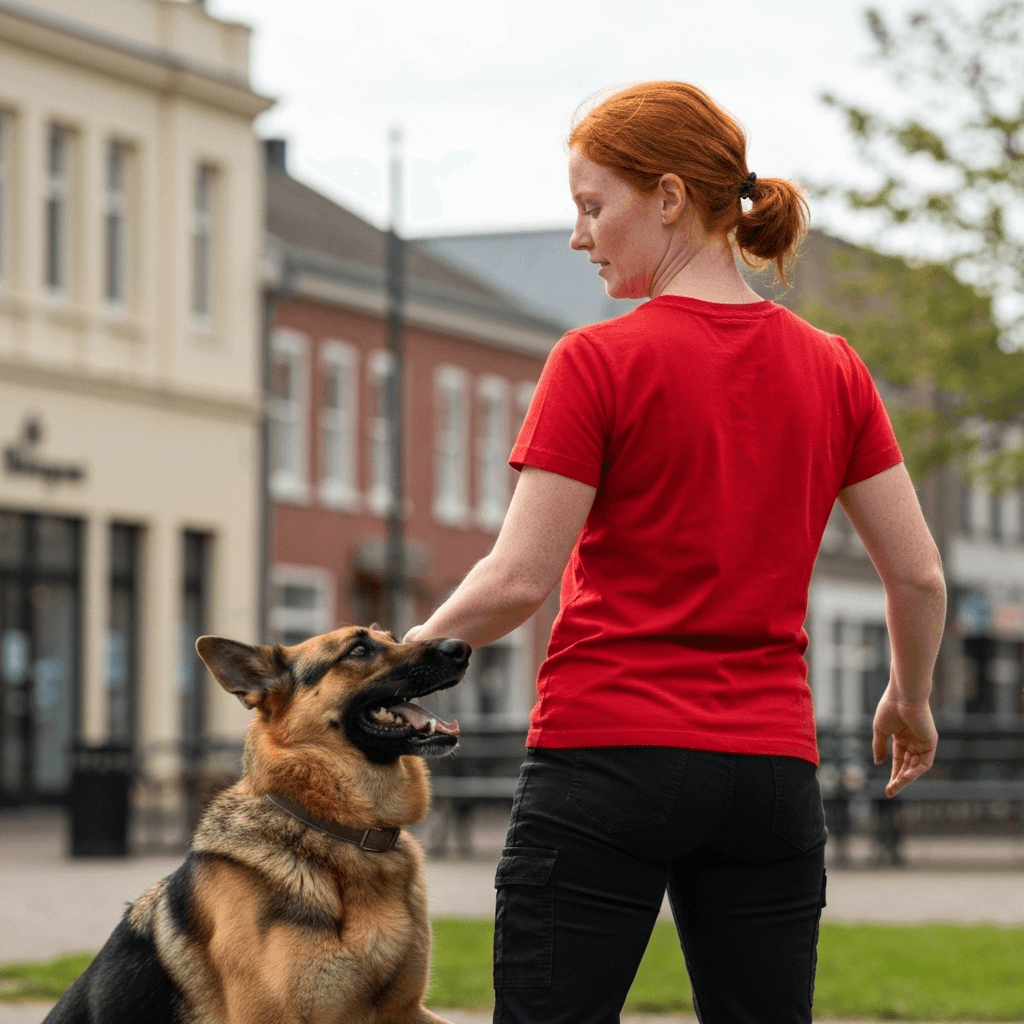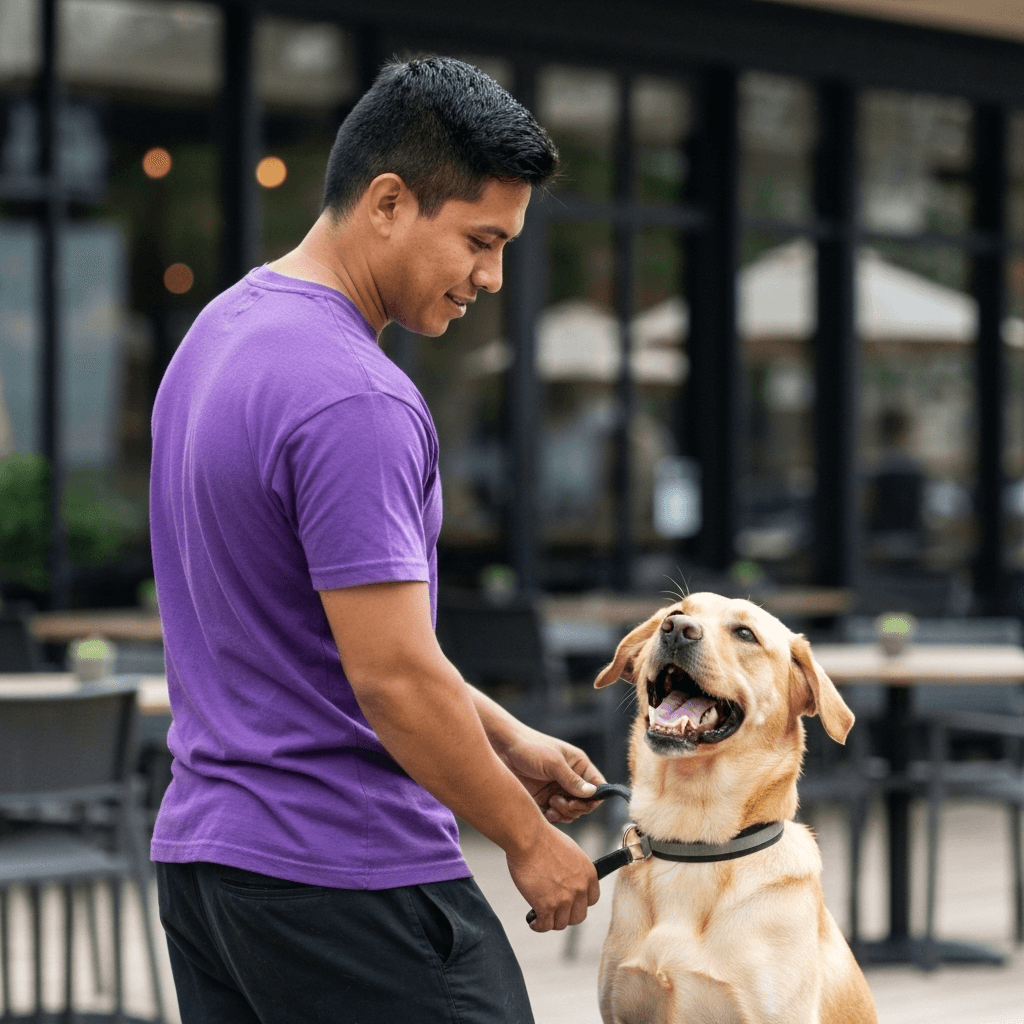Your Complete Guide to Choosing a Dog Trainer in West Bend
When you’re walking your dog down West Bend’s Main Street or exploring the Riverwalk, you want a pup who can handle the sights and sounds with confidence. Training that works in real life means your dog stays calm when bikes whiz by on the Eisenbahn Trail, greets kids politely at Regner Park, and doesn’t pull you toward every outdoor dining area downtown.
Since West Bend sits in Washington County, you’ll follow local city and county rules for dogs. The best training programs practice these real-world situations, so your dog learns to be a good neighbor whether you’re strolling through downtown or hiking county trails.
How to Choose the Right Trainer
Start by looking for trainers who use positive reinforcement methods and can help with the specific challenges you face living here. Maybe that’s teaching loose-leash walking for busy sidewalks, polite greetings at the dog park, or a solid recall before you try any off-leash adventures.
When comparing trainers, ask about their credentials. Look for certifications like KPA-CTP, CPDT-KA, or behavior specialists with IAABC-CDBC or CBCC-KA. Some complete programs like CTC or add hands-on skills with CPDT-KSA. You can learn more about dog trainer certifications to understand what these letters mean.
In-home dog training works especially well for puppies learning the basics, fixing door-rushing problems, or dealing with backyard reactivity. Group classes make sense once your dog can focus around other dogs, especially if you plan to attend crowded events like Old Settlers Day.
Board and train programs can help when you’re short on time, but make sure the trainer explains exactly how they’ll help you maintain the skills once your dog comes home.
Common Dog Training Methods Explained

The most effective training methods build trust between you and your dog while helping you follow West Bend’s leash laws and noise ordinances. Reward-based training also works better in our busy downtown areas and shared trail spaces.
Basic obedience covers the essentials: sit, down, stay, recall, and leash manners for navigating parks, restaurant patios, and social visits. Puppy training focuses on socialization, potty training, crate comfort, and bite inhibition before bad habits become ingrained.
When dogs struggle with reactivity, fear, resource guarding, or separation anxiety, behavior modification uses careful, gradual plans to help them feel more confident. Private lessons and in-home training let you work on specific issues like door greetings, excessive barking, or pulling on neighborhood walks.
Group classes help dogs learn to focus despite distractions from other dogs and people. For specialized work like therapy or service dog training, you’ll need structured public-access training with lots of practice in real-world settings.
Avoid any trainer who relies on intimidation, shock collars, or punishment-based methods. Positive reinforcement training creates lasting results that are safer and easier for you to maintain at home.
Average Cost of Dog Training in West Bend (Updated for 2025)
Training costs in West Bend and Washington County depend on the trainer’s experience, session length, and whether they come to you or you go to them. Here’s what you can expect to pay in 2025:
| Service Type | Average Cost (West Bend/Washington County) |
|---|---|
| Puppy classes (4–6 weeks) | $140–$260 total |
| Group obedience training (4–6 weeks) | $150–$280 total |
| Private lessons (60–90 min) | $95–$170 per session |
| In-home coaching packages (4–6 visits) | $420–$850 total |
| Day training (trainer works your dog + handoff) | $450–$900 per week |
| Behavior consult for reactivity/anxiety | $130–$220 initial |
| Board and train (2–4 weeks) | $1,900–$3,800 total |
Trainers may charge extra for longer drives within the county, and complex behavior cases typically cost more. Always ask what’s included in the price, how they track progress, and whether they offer a brief phone consultation before you commit.
Questions to Ask a Potential Dog Trainer
Before you choose a trainer, have a conversation about their approach and experience. Here are the key questions that will help you make the right choice:
- What training methods do you use, and how do you keep sessions positive and stress-free?
- What credentials do you have, like KPA-CTP, CPDT-KA, or IAABC-CDBC, and how do you keep learning?
- How will you customize training for our West Bend lifestyle, including downtown distractions and park visits?
- Do you offer in-home training, group classes, or day training, and which would work best for our goals?
- How will we know if the training is working, and when will you add more challenging situations?
- What are the total costs, including any travel fees, and what’s your cancellation policy?
- Do you carry liability insurance, and can you show me proof?
- For behavior problems, will you work with our veterinarian if needed?
Local Rules and Considerations in West Bend and Washington County
West Bend enforces leash laws and noise ordinances to keep everyone safe and happy. Understanding these rules makes training easier and helps you avoid conflicts with neighbors or citations from animal control.
Dogs must stay on leash and under your control in all public spaces, except inside designated off-leash dog parks. You’re required to clean up after your dog everywhere, including trails and natural areas.
Excessive barking or letting your dog roam free can result in nuisance citations and fines. Wisconsin law requires current rabies vaccination and an annual dog license, typically due in early spring through your local city clerk.
Make sure your dog wears current license and rabies tags on their collar whenever you’re out together. If your trainer wants to use public parks for lessons, they may need permits and proof of insurance, so ask about this before scheduling sessions in busy areas.
For Wisconsin’s rabies requirements and owner responsibilities, check the Wisconsin Department of Health Services at Wisconsin DHS Rabies.
You can find county dog park information and passes for the Sandy Knoll area through Washington County Parks at Sandy Knoll County Park.
If you need guidance about animal bites and post-exposure procedures in Washington County, start with local health department information at Washington Ozaukee Public Health Rabies.
Local West Bend Resources for Dog Owners and Surrounding Areas
These local spots give you great places to practice training skills while following posted rules and dog park etiquette. Start with easier locations and work up to busier areas as your dog improves.
Sandy Paws Dog Park at Sandy Knoll County Park offers fenced off-leash areas near West Bend with clear rules and separate spaces for different-sized dogs. Homestead Howl Dog Park at Homestead Hollow County Park in Germantown provides another option for off-leash practice.
The Menomonee Park Dog Exercise Area in Menomonee Falls gives you varied spaces to work on controlled recalls and social skills. For on-leash training, try the West Bend Riverwalk and Eisenbahn State Trail where you’ll encounter bikes, strollers, and light foot traffic.
Regner Park works well for practicing calm behavior around playgrounds, community events, and picnic areas where there’s always something interesting happening.

Common Questions
How much does in-home dog training cost?
Most trainers in the West Bend area charge $95–$170 per in-home session, with discounts available when you book multiple visits. Complex behavior cases usually fall at the higher end of this range.
Is in-home dog training worth it?
Absolutely, because you’re working on problems exactly where they happen. Door greetings, counter surfing, backyard barking, and leash pulling improve much faster when you practice at home and in your actual neighborhood.
Can you pay someone to house train your dog?
Many trainers offer puppy programs that include potty training, crate schedules, and house routines. Day training programs can speed up the process while teaching you how to keep up the good habits.
What is the 3-3-3 rule for dog training?
This guideline suggests dogs need about 3 days to decompress from stress, 3 weeks to learn new routines, and 3 months to feel completely settled. Training programs that follow this timeline tend to have fewer setbacks.
How long will it take to reach my training goals?
Most puppies and easy-going adult dogs show solid improvement in 4–8 weeks with daily practice. Dogs with reactivity, fear, or aggression issues often need several months of careful behavior modification work.
What should I bring to group classes?
Pack high-value treats, a flat collar or harness, a standard 6-foot leash, water for your dog, and current vaccination records if the trainer requests them. Leave retractable leashes at home for everyone’s safety.
What’s the leash law in West Bend?
Dogs must be on leash in all public spaces except inside designated off-leash dog parks. Keep your dog under control and clean up waste wherever you go.
Do I need a dog license in West Bend or Washington County?
Yes, Wisconsin requires current rabies vaccination and an annual license through your local city or village. Most licenses need renewal by early spring, so contact your municipal clerk for specific deadlines and fees.
What shots does my dog need in Washington County or Wisconsin?
Rabies vaccination is required by state law. Your veterinarian may also recommend distemper-parvo combination vaccines and bordetella based on your dog’s lifestyle and exposure risks.
Are dog trainers required to be licensed in West Bend or Washington County or Wisconsin?
Dog trainers don’t need special state licenses, but they must follow normal business regulations. Facilities that board dogs or run large operations may need additional permits or inspections depending on their services.
Where can I practice off-leash recall?
Use fenced dog parks like Sandy Paws or Homestead Howl for safe off-leash practice. Start during quieter times of day, then gradually add more distractions as your dog’s skills improve.
Which dog parks allow training around West Bend?
Sandy Paws Dog Park and Homestead Howl Dog Park both welcome training activities inside their fenced areas. Keep sessions short and positive, and always follow posted park rules.
What beaches or trails allow dogs for training?
West Bend doesn’t have public beaches, but leashed dogs are welcome on the Eisenbahn State Trail and most city paths. Always check posted signs and keep a standard 6-foot leash ready.
Do trainers need insurance to teach in parks?
While Wisconsin doesn’t require trainers to carry insurance, many parks and facilities ask for proof of liability coverage before allowing commercial training sessions. Check requirements before scheduling lessons in public spaces.
Finding the right professional dog trainer who understands West Bend’s unique environment will help your dog navigate everything from downtown festivals to quiet trail walks with confidence. Focus on trainers who use humane methods, set clear goals, and practice in real-world situations so you end up with a well-behaved dog who’s truly part of your West Bend community.
